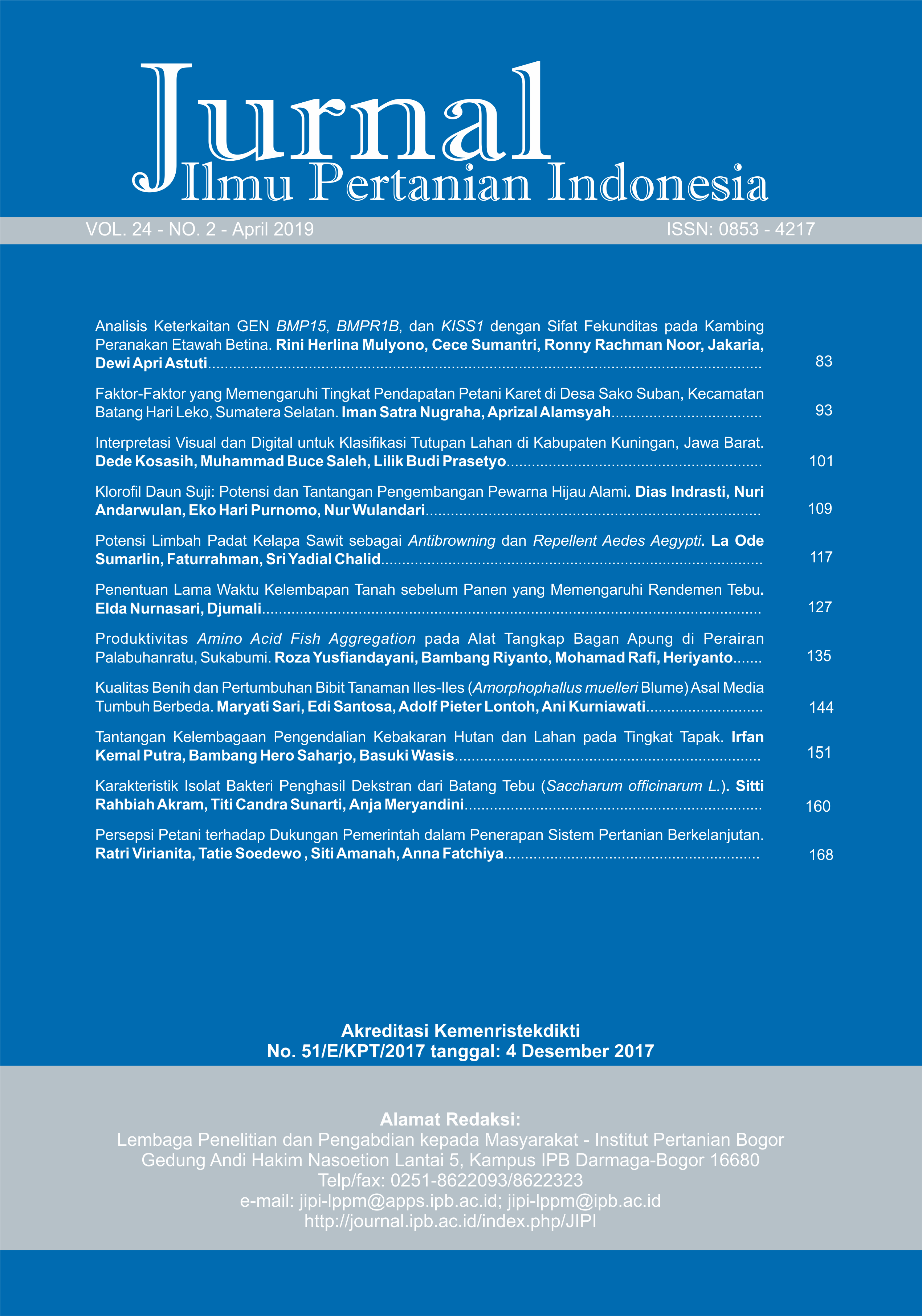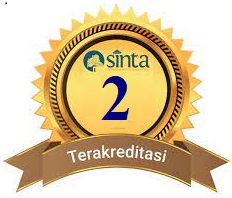Intensitas Fungsi Modal Sosial untuk Penguatan Posisi Tawar Pengrajin dalam Pemasaran Souvenir Olahan Limbah Kelapa
Abstract
A weak bargaining position in product marketing is a serious problem for farmers including those who diversify their livelihood patterns as souvenir craftsmen. Collector traders and retailers are dominant to set prices for souvenirs. Souvenir craftsmen surrender to accept any price level determination. As a consequence, souvenir craftsmen in the villages of Baturaden and Purbalingga Wetan have difficulties in earning profits from micro-souvenir businesses. The results of this study found that a solution to overcome the problem of the weak bargaining position of craftsmen in marketing souvenir products is through the use of a social-capital creation approach. The intensity of network functions of cooperation, mutual trust, values, and norms have different values in each bargaining position activity. Price domination by collectors and retailers is not only due to the dilemma of patron-client relationships. The qualities of souvenir products that are still not qualified turned out to be the cause of the weak bargaining position of craftsmen. The creation of social capital has a real function to strengthen the bargaining position of craftsmen in marketing souvenirs. The intensity of the function of social capital needs to be increased through the development of product quality, bargaining courage, and the ability to make price decisions in an agreement.
Downloads
References
Aminah S, Sumardjo, Lubis DP, Susanto D. 2015. Efecting peasants empowerment in West Halmahera District: A Case study from Indonesia. Journal of Agriculture and Rural Development in the Tropics and Subtropics. 116(1): 11-15.
[BPS] Badan Pusat Statistik. 2018. Laporan Jumlah Penduduk Miskin Indonesia Tahun 2017. Jakarta (ID).
Cohen DJ, Prusak. 2001. Lauren. In good company: how social capital makes organizations work. Boston (US): Harvard Business School Press. https://doi.org/10.1145/358974.358979
Coleman JS. 1988. Social capital in the creations of human capital. The American Journal of Sociology. 94(1988): 95-121. https://doi.org/10.1086/228943
Courtois P, Subervie J. 2015. Farmer bargaining power and market information for services. American Journal of Agricultural Economics. 97(3): 1157-1182. https://doi.org/10.1093/ajae/aau051
Cox E. 1995. Raising social capital. Sydney (AU): ABC Books.
Darmawan W, Nandika D, Noviyanti E, Alipraja I, Dumasari L, Gardner D, Gerardin P. 2017. Wettability and bonding quality of exterior coatings on Jabon and Sengon wood surface. Journal of Coating Technology and Research. 15(1): 95-104. https://doi.org/10.1007/s11998-017-9954-1
Darmawan W, Nandika D, Afaf BDH, Rahayu I, Dumasari L. 2018. Radial variation in selected wood properties of Indonesian Merkusii Fine. Journal of The Korean Wood Science Technology. 46(4): 323-337.
Dumasari D, Watemin W. 2013. Karakteristik Sosial Ekonomi Petani Miskin dalam Pengelolaan Usaha Mikro “Tourism Souvenir Goods”. Mimbar Journal. 29(2): 205-214. https://doi.org/10.29313/mimbar. v29i2.398
Dumasari D. 2014. Kewirausahaan Petani dalam Pengelolaan Bisnis Mikro di Pedesaan. Jurnal Inovasi dan Kewirausahaan. 3(3): 196-202. https://doi.org/10.20885/ajie.vol3.iss3.art4
Dumasari D, Rahayu TSM. 2016. Management Strategy of Creative Souvenir Micro Enterprise for the Empowerment of Craftsmen Peasant. Mimbar: The Journal of Social and Development. 32(1): 175-186. https://doi.org/10.29313/mimbar.v32i1. 1717
Dumasari D, Budiningsih S, Darmawan W, Santosa I. 2017. Various determinant factors of production technology adoption in creative souvenir micro enterprise. Journal of Arts and Humanities. 6(10): 1-6. https://doi.org/10.18533/journal.v6i10.1273
Dumasari D, Darmawan W, Iqbal A. Dharmawan B, Santosa I. 2019. Development of Production Creativity among Craftsmen by Identifying Techniques for Characterizing Coconut Waste. International Journal on Advanced Science Engineering and Information Technology. 9(2): 717-723. https://doi.org/10.18517/ijaseit.9.2.5871
Fengfan J, Yue H. 2017. Traditional Tie-dye Handicraft and Modern Design Concept Combined. Journal of Arts and Humanities. 6(8): 12-15. https:// doi.org/10.18533/journal.v6i9.1230
Fukuyama F. 1995. Trust: The social virtues and the creation of prosperity. London (EN): Hamish Hamilton.
Hansen G, Grave A. 2015. The role of human and social capital in dairy farming. Journal Rural Society. 24(2). 154-176. https://doi.org/10.1080/ 10371656.2015.1060718
Hasbullah J. 2006. Social capital: towards human culture excellence in Indonesia. Jakarta (ID): MR-Unites Press.
Heliawaty M, Saleh SA, Darmawan S, Mappangaja R. 2015. Social capital and economic behavior of farmers. International Journal of Scientific & Technology Research. 4(1): 89-91.
Jana R, Bandyopadhyay S, Choudhuri AK. 2013. Reciprocity among farmers in farming system research: Application of social network analysis. Journal of Human Ecology. International Interdisciplinary Journal of Man Environment Relationship. 41(1): 45-51. https://doi.org/ 10.1080/09709274.2013.11906552
Kolade O, Harpham T. 2014. Impact of cooperative membership on farmers' uptake of technological innovations in Southwest Nigeria. Development Studies Research Journal. 1(1): 340-353. https://doi.org/10.1080/21665095.2014.978981
Lemus YM, Vieyra A. 2017. How social capital enables or restricts the livelihoods of poor peri-urban farmers in Mexico. Journal of Development Practice. 27(3): 301-315. https://doi.org/10.1080/ 09614524.2017.1296109
Lin N. 2001. Social capital: A theory of social structure action. Cambridge (EN): Cambridge University Press. https://doi.org/10.1017/CBO9780511815447
Miles MB, Huberman AM. 1994. Qualitative data analysis: A source book of new methods. California (US): SAGE Publications Inc.
Ojha JK, Mishra B. 2013. Building capacities of rural women artisans; case studies of women empowerment from Thar Desert of Western Rajasthan. Journal of Rural Development. 32(3): 291-300.
Pugersari D, Achmad S, Larasati D. 2013. Experiments on the development of commercial value based commercial functional products of coconut sshrimp with softening techniques. Journal of Visual Art and Design. 5(1): 74-91. https://doi.org/10.5614/itbj. vad.2013.5.1.5
Putnam RD. 1995. Bowling alone: America’s declining Social capital. Journal of Democracy. 6: 65-78. https://doi.org/10.1353/jod.1995.0002
Santosa I, Suyanto A. 2016. Farmer empowerment through development of ecotecnopreneurship by managing mix farming based on social capital. Journal of Business, Management, and Social Research. 3(1): 140-147. https://doi.org/10.18801/ ijbmsr.030116.16
Syahyuti. 2008. Peran Modal Sosial (social capital) dalam Perdagangan Hasil Pertanian. Jurnal Forus Penelitian Agro Ekonomi. 26(1). 32-43. https:// doi.org/10.21082/fae.v26n1.2008.32-43
Vadakepat VM. 2013. Rural retailing: challenges to traditional handicrafts. Journal of Global Marketing. 26(5): 273-283. https://doi.org/10.1080/08911762. 2013.830169
Willy DK, Muller KH. 2013. Social influence andcollective action effects on farm level soil conservation effort in rural Kenya. Ecological Economics Journal. 9: 94-103. https://doi.org/ 10.1016/j.ecolecon.2013.03.008
This journal is published under the terms of the Creative Commons Attribution-NonCommercial 4.0 International License. Authors who publish with this journal agree to the following terms: Authors retain copyright and grant the journal right of first publication with the work simultaneously licensed under a Creative Commons Attribution-NonCommercial 4.0 International License. Attribution — You must give appropriate credit, provide a link to the license, and indicate if changes were made. You may do so in any reasonable manner, but not in any way that suggests the licensor endorses you or your use. NonCommercial — You may not use the material for commercial purposes.






















